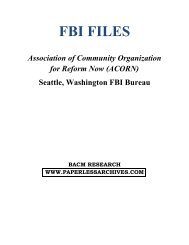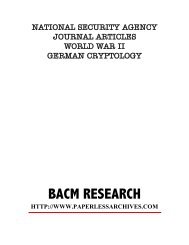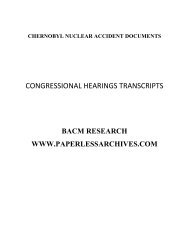Chernobyl Nuclear Power Plant CIA Files - Paperless Archives
Chernobyl Nuclear Power Plant CIA Files - Paperless Archives
Chernobyl Nuclear Power Plant CIA Files - Paperless Archives
You also want an ePaper? Increase the reach of your titles
YUMPU automatically turns print PDFs into web optimized ePapers that Google loves.
'.<br />
..,j<br />
The new consciousness about environmental issues spurred by <strong>Chernobyl</strong>'<br />
has contributed to a climate of public activism that could contest Moscow's<br />
plans for nuclear power expansion in the next decade. Some 60 members of<br />
the Ukrainian Academy of Sciences signed a petition opposing the<br />
completion of units 5 and 6 at <strong>Chernobyl</strong>' because the project leaders had<br />
failed to adjust their plans to the new postaccident conditions. Reportedly,<br />
the petition was about to be made public when Moscow decided to shelve<br />
the expansion plans for the nuclear plant, conceivably in response to the<br />
arguments advanced by the Ukrainian group and possibly other public<br />
opposition.<br />
Local Soviet press accounts indicate that concern about the safety of the<br />
nuclear industry is particularly high in areas with <strong>Chernobyl</strong>'-type reactors,<br />
like Kursk, Leningrad, Smolensk, Ignalina, and <strong>Chernobyl</strong>' itself.<br />
Demonstrations against the Ignalina and Leningrad nuclear plants were·<br />
held in June 1986 as well as this year, and there is evidence that two nuclear<br />
projects have been recently shelved because of public reaction. Even<br />
though there have been greater efforts to reassure the public and perhaos<br />
some rethinkin2 of the strategy Cor siting nuclear power plants, .C<br />
C _ ::Jlhe public's apprehension about the regime's<br />
commitment to make the necesSary safety modifications remains well J<br />
founded. I ....<br />
Despite the fact that ministries responsible for nuclear industry have been<br />
given a formal mandate to achieve more stringent safety standards, there is<br />
no indication that public resentment will compel changes in the direction of<br />
Soviet nuclear power policy. The major bureaucracies resent public<br />
pressure and there are some signs of backtracking on glasnost:<br />
• Despite Moscow's avowed openness policy, the July 1987 legal Collowup<br />
of the accident was conducted in secret, probablY in an effort to avoid revealing<br />
technical testimony that addressed. reactor design flaws.<br />
• In the spring of 1987, Soviet reporters complained that the authorities<br />
were still tightly controlling inCormation on <strong>Chernobyl</strong>" leaving the<br />
public largely in the dark.<br />
• The official Soviet report presented to the International Atomic Energy<br />
I Agency at the August 1986 meeting in Vienna, and made widely<br />
av~il"hlc to the West, was never released to the Soviet general public.<br />
.:I<br />
Soviet leaders probably hope that the consequences of <strong>Chernobyl</strong>' will fade<br />
from public view. Continued publicity poses difficulties because long-term<br />
environmental and health consequences will require further allocations of<br />
resources, which Moscow appears unwilling to make. A debate about the<br />
vii
















